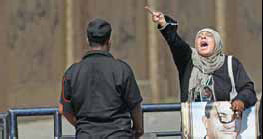Egypt's beleaguered Mubarak appeals to future generations
|
A supporter of Egypt's former president Hosni Mubarak shouts slogans against Egyptian President Mohammed Morsi and members of the Muslim Brotherhood. Amr Abdallah Dalsh / Reuters |
Egypt's former president Hosni Mubarak, on trial for the deaths of protesters during the country's 2011 uprising that toppled him, said future generations would judge him "fairly" in an interview published on Sunday.
"I have said in the past that history would bear witness and judge, and I am still certain that future generations will judge me fairly," Mubarak told Al-Watan newspaper on the sidelines of his retrial on Saturday.
The independent Al-Watan, which is highly critical of Egypt's new ruling Islamists, said the interview was the first the ex-president gave since he was forced to quit in February 2011 after massive protests against his 30-year rule.
Mubarak also said that it was too early to judge his successor Mohammed Morsi, a member of the influential Muslim Brotherhood movement and arch foe of the toppled leader.
"I do not want to talk about that subject but, in the end, he's a new president who bears heavy responsibilities for the first time and who shouldn't be judged for the moment," Mubarak said when asked to comment on Morsi. Mubarak, 85, also said that he was "very, very sad" for the poorest Egyptians who face a deteriorating economic and security situation.
"Throughout my presidency, I took care of people on low incomes. I refused to take any measures against them. That is the secret of my sadness: to see the situation of people on low incomes," he said.
Concerns for the poor
Mubarak was detained two years ago and put on trial for complicity in the killing of nearly 900 protesters in the first days of the revolt against him. He has since been hospitalized, sentenced to life in prison and then granted a retrial. He is also accused in a number of corruption cases, where prosecutors are investigating his family wealth amid claims he amassed a formidable fortune while in power. His two sons are also on trial on corruption charges.
Mubarak said he feared for the country's future and its poor people should tough economic measures be imposed to acquire a $4.8 billion loan from the IMF. Egypt's economy took a hard hit over the last two years as foreign reserves dwindled, foreign investment sharply declined and tourists largely stayed away amid political turmoil.
Morsi's government would have to impose likely unpopular austerity measures as part of an economic reform program it is currently negotiating with the IMF, but talks have dragged on while politics remain deeply polarized and consensus on managing the country's affairs is elusive.
Al-Watan's reporter, Mohammed el-Sheik, said he conducted the interview after sneaking into a rest area where Mubarak was held before being transported back to prison in a helicopter. El-Sheik told the private ONTV station on Sunday that he couldn't record the interview because he had sneaked in to see Mubarak amid tight security.
AFP-AP
(China Daily 05/13/2013 page12)









